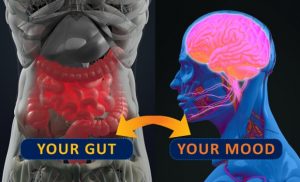 Have you ever experienced a sensation in your stomach that felt like knots being tied? Have you suddenly had a strong urge to rush to the bathroom before publicly speaking? Has the urge to vomit ever occurred during times of intense stress? If you answered “yes” to any of these questions, then you are like millions of others whose digestive system is heavily affected by their mood. The good news is that you’re not abnormal, but understanding the relationship between your gut and mental state can help you gain better control of your digestive problems.
Have you ever experienced a sensation in your stomach that felt like knots being tied? Have you suddenly had a strong urge to rush to the bathroom before publicly speaking? Has the urge to vomit ever occurred during times of intense stress? If you answered “yes” to any of these questions, then you are like millions of others whose digestive system is heavily affected by their mood. The good news is that you’re not abnormal, but understanding the relationship between your gut and mental state can help you gain better control of your digestive problems.
Digestive flare-ups during times of high-stress and anxiety are commonly reported among patients with irritable bowel syndrome, but these symptoms can occur in just about anyone. There is a strong link between one’s mind and gut.
The mind-gut connection
Advertisement
You may not know this, but your gut contains several neurons similar to that of the body’s spinal cord. Some researchers have described the guts neurons as a “local mini-brain,” as it stores information about the gut.
Because the gut is made up of all these neuron connections, it can send messages to the brain just as the brain sends messages to the gut. This is how and why we feel hunger, fullness, pain, and nausea.
This constant communication between the brain and the gut is what keeps our bodies working smoothly, but unfortunately, during times of high stress, those lines of communication become scrambled. This results in symptoms such as upset stomach, constipation, or diarrhea.
During times of stress, the body becomes flooded with adrenaline and CFR hormone. People who live with constant stress are constantly flooded with these hormones, which negatively affects the digestive system.
How to treat digestive troubles
Advertisement
If you suspect that your digestive symptoms are a result of stress, you can work to improve them by reducing the amount of stress in your life. There are numerous ways to reduce stress, such as regular exercise, yoga, meditation, speaking to a counselor or psychiatrist, or highlighting the cause of your stress and working to improve the situation. The first step is to identify your stress triggers to begin to reduce them.
Living with digestive problems can be detrimental to overall quality of life. so you’ll want to take control of your digestion rather than allow it to take control of you.
If you’ve tried other lifestyle changes in order to improve digestion—drinking more water, exercising, increasing fiber intake—and you don’t notice a difference, you may want to take a closer look at your stress levels.
